Oil and Gas Industry: Production & Finance
VerifiedAdded on 2020/02/03
|9
|2657
|52
Literature Review
AI Summary
This assignment delves into the complexities of production sharing agreements within the oil and gas industry. It explores the historical context of concessions and their shortcomings, highlighting the emergence of production sharing as a more equitable solution. The document analyzes the advantages and disadvantages of this system for all parties involved, including governments, companies, and local communities.
Contribute Materials
Your contribution can guide someone’s learning journey. Share your
documents today.
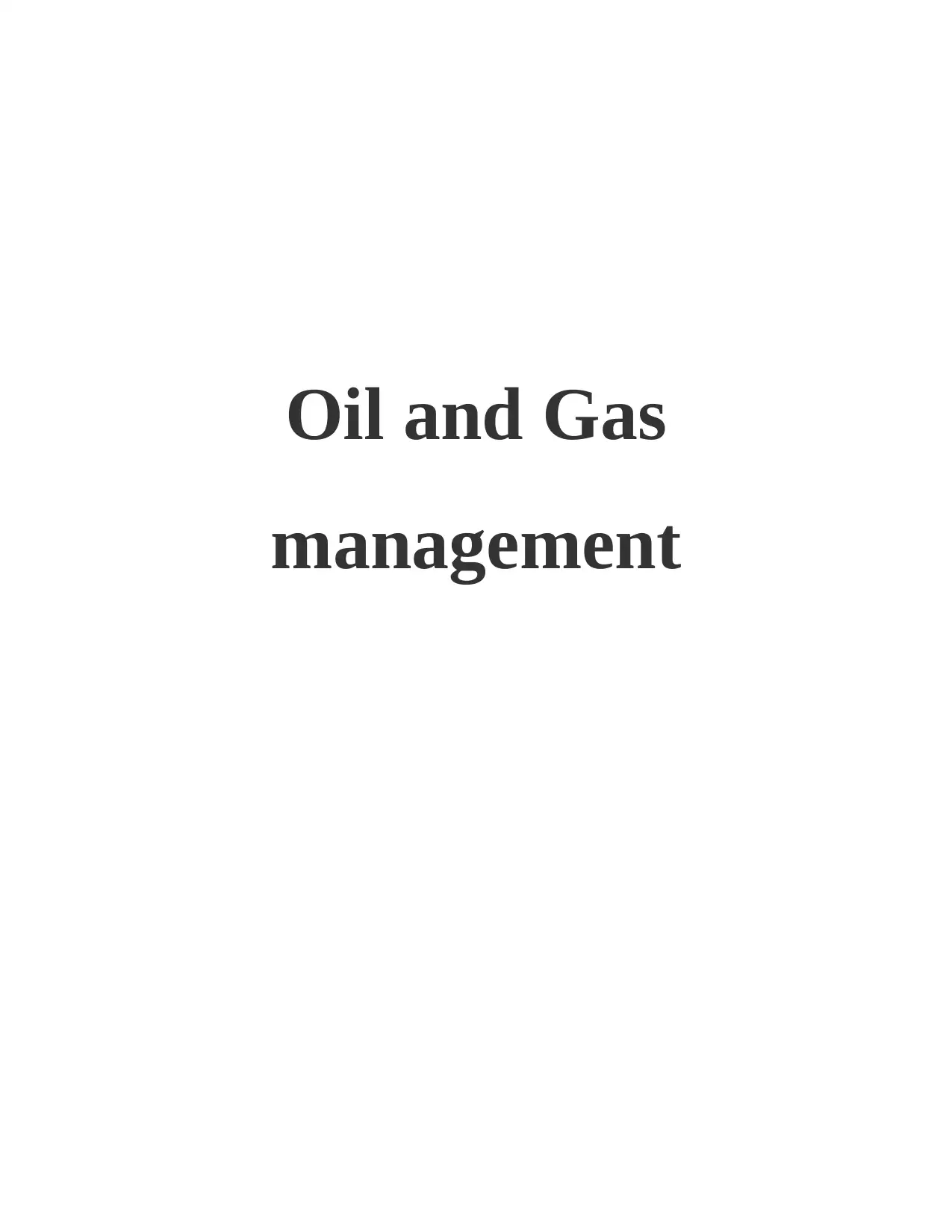
Oil and Gas
management
management
Secure Best Marks with AI Grader
Need help grading? Try our AI Grader for instant feedback on your assignments.

Table of Contents
INTRODUCTION...........................................................................................................................2
CONCLUSION................................................................................................................................7
REFERENCES................................................................................................................................8
1
INTRODUCTION...........................................................................................................................2
CONCLUSION................................................................................................................................7
REFERENCES................................................................................................................................8
1
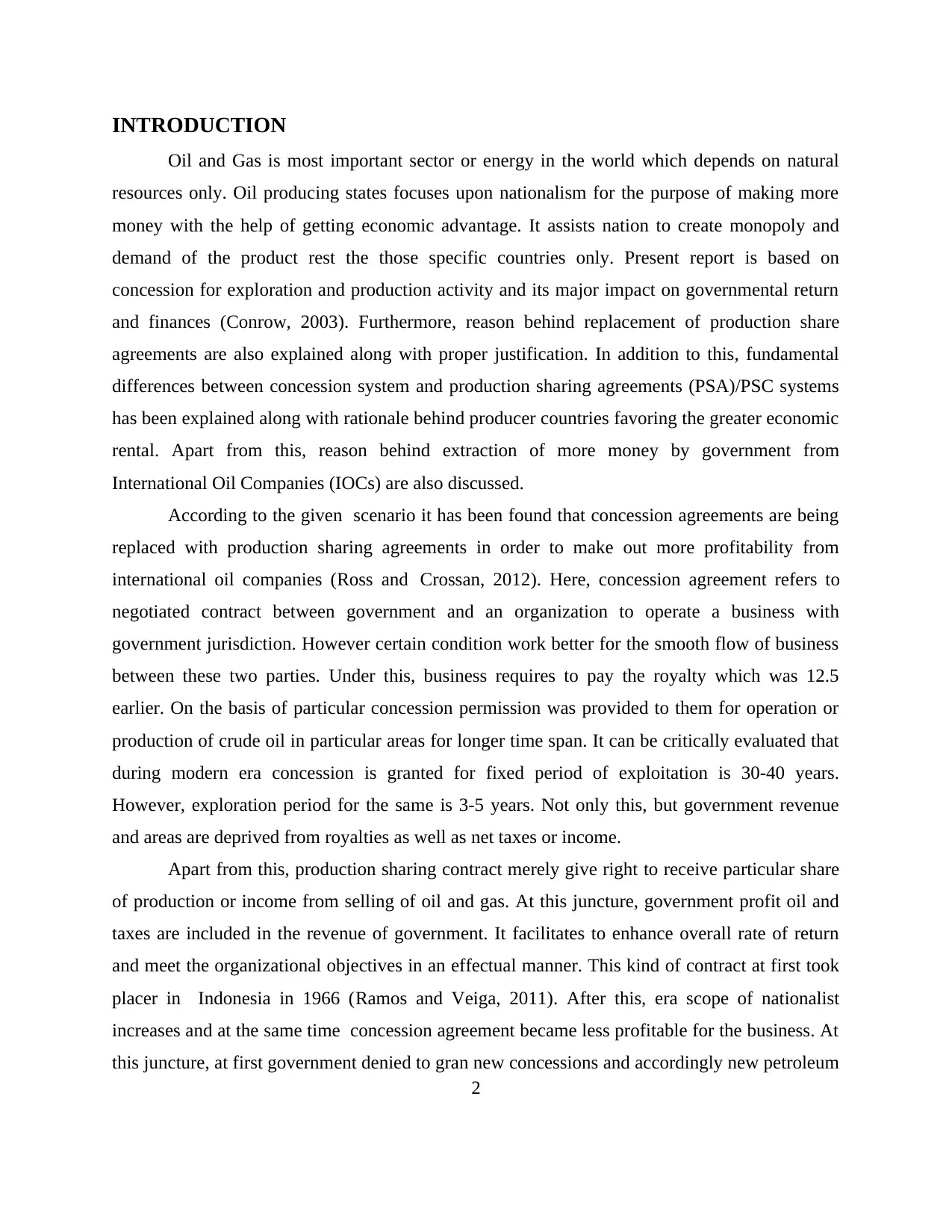
INTRODUCTION
Oil and Gas is most important sector or energy in the world which depends on natural
resources only. Oil producing states focuses upon nationalism for the purpose of making more
money with the help of getting economic advantage. It assists nation to create monopoly and
demand of the product rest the those specific countries only. Present report is based on
concession for exploration and production activity and its major impact on governmental return
and finances (Conrow, 2003). Furthermore, reason behind replacement of production share
agreements are also explained along with proper justification. In addition to this, fundamental
differences between concession system and production sharing agreements (PSA)/PSC systems
has been explained along with rationale behind producer countries favoring the greater economic
rental. Apart from this, reason behind extraction of more money by government from
International Oil Companies (IOCs) are also discussed.
According to the given scenario it has been found that concession agreements are being
replaced with production sharing agreements in order to make out more profitability from
international oil companies (Ross and Crossan, 2012). Here, concession agreement refers to
negotiated contract between government and an organization to operate a business with
government jurisdiction. However certain condition work better for the smooth flow of business
between these two parties. Under this, business requires to pay the royalty which was 12.5
earlier. On the basis of particular concession permission was provided to them for operation or
production of crude oil in particular areas for longer time span. It can be critically evaluated that
during modern era concession is granted for fixed period of exploitation is 30-40 years.
However, exploration period for the same is 3-5 years. Not only this, but government revenue
and areas are deprived from royalties as well as net taxes or income.
Apart from this, production sharing contract merely give right to receive particular share
of production or income from selling of oil and gas. At this juncture, government profit oil and
taxes are included in the revenue of government. It facilitates to enhance overall rate of return
and meet the organizational objectives in an effectual manner. This kind of contract at first took
placer in Indonesia in 1966 (Ramos and Veiga, 2011). After this, era scope of nationalist
increases and at the same time concession agreement became less profitable for the business. At
this juncture, at first government denied to gran new concessions and accordingly new petroleum
2
Oil and Gas is most important sector or energy in the world which depends on natural
resources only. Oil producing states focuses upon nationalism for the purpose of making more
money with the help of getting economic advantage. It assists nation to create monopoly and
demand of the product rest the those specific countries only. Present report is based on
concession for exploration and production activity and its major impact on governmental return
and finances (Conrow, 2003). Furthermore, reason behind replacement of production share
agreements are also explained along with proper justification. In addition to this, fundamental
differences between concession system and production sharing agreements (PSA)/PSC systems
has been explained along with rationale behind producer countries favoring the greater economic
rental. Apart from this, reason behind extraction of more money by government from
International Oil Companies (IOCs) are also discussed.
According to the given scenario it has been found that concession agreements are being
replaced with production sharing agreements in order to make out more profitability from
international oil companies (Ross and Crossan, 2012). Here, concession agreement refers to
negotiated contract between government and an organization to operate a business with
government jurisdiction. However certain condition work better for the smooth flow of business
between these two parties. Under this, business requires to pay the royalty which was 12.5
earlier. On the basis of particular concession permission was provided to them for operation or
production of crude oil in particular areas for longer time span. It can be critically evaluated that
during modern era concession is granted for fixed period of exploitation is 30-40 years.
However, exploration period for the same is 3-5 years. Not only this, but government revenue
and areas are deprived from royalties as well as net taxes or income.
Apart from this, production sharing contract merely give right to receive particular share
of production or income from selling of oil and gas. At this juncture, government profit oil and
taxes are included in the revenue of government. It facilitates to enhance overall rate of return
and meet the organizational objectives in an effectual manner. This kind of contract at first took
placer in Indonesia in 1966 (Ramos and Veiga, 2011). After this, era scope of nationalist
increases and at the same time concession agreement became less profitable for the business. At
this juncture, at first government denied to gran new concessions and accordingly new petroleum
2
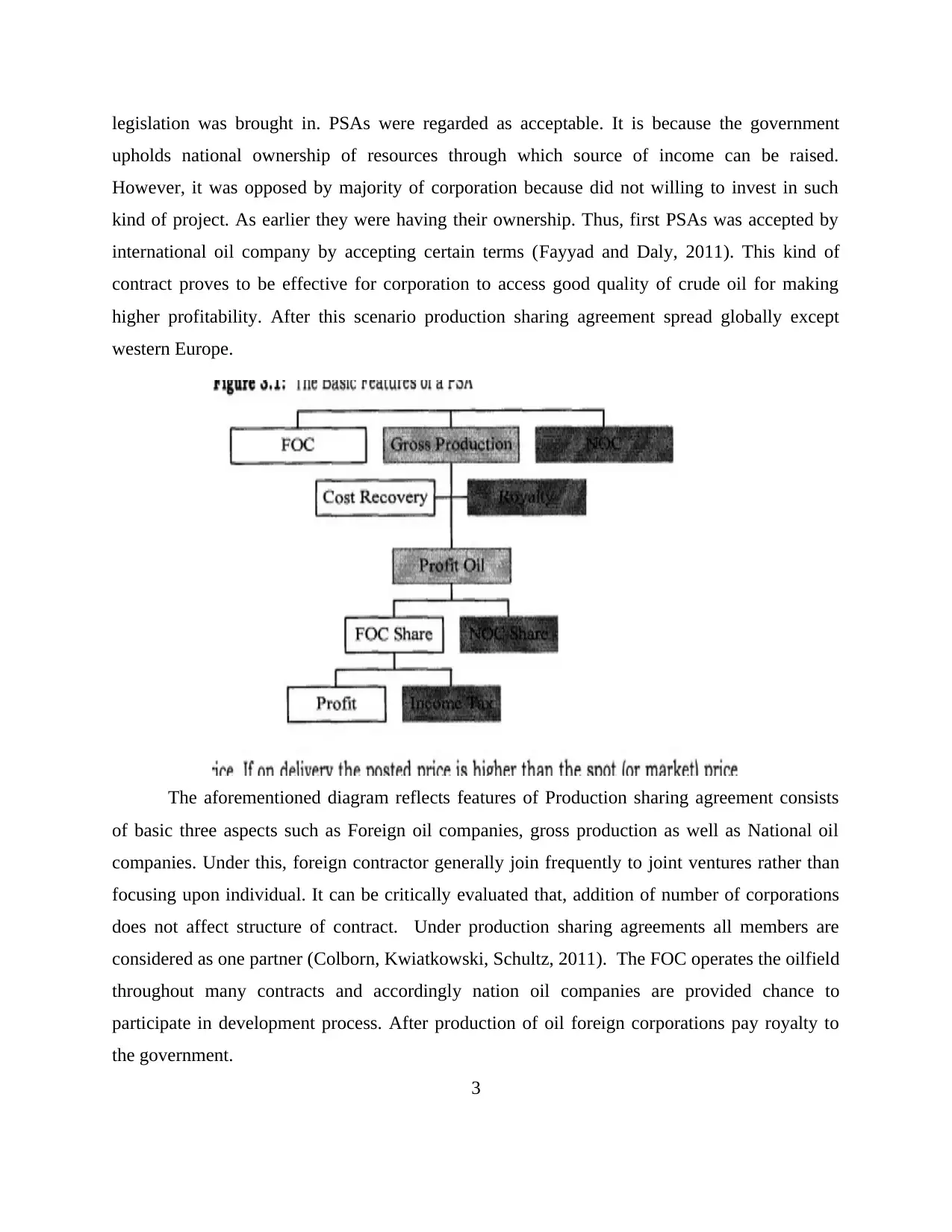
legislation was brought in. PSAs were regarded as acceptable. It is because the government
upholds national ownership of resources through which source of income can be raised.
However, it was opposed by majority of corporation because did not willing to invest in such
kind of project. As earlier they were having their ownership. Thus, first PSAs was accepted by
international oil company by accepting certain terms (Fayyad and Daly, 2011). This kind of
contract proves to be effective for corporation to access good quality of crude oil for making
higher profitability. After this scenario production sharing agreement spread globally except
western Europe.
The aforementioned diagram reflects features of Production sharing agreement consists
of basic three aspects such as Foreign oil companies, gross production as well as National oil
companies. Under this, foreign contractor generally join frequently to joint ventures rather than
focusing upon individual. It can be critically evaluated that, addition of number of corporations
does not affect structure of contract. Under production sharing agreements all members are
considered as one partner (Colborn, Kwiatkowski, Schultz, 2011). The FOC operates the oilfield
throughout many contracts and accordingly nation oil companies are provided chance to
participate in development process. After production of oil foreign corporations pay royalty to
the government.
3
upholds national ownership of resources through which source of income can be raised.
However, it was opposed by majority of corporation because did not willing to invest in such
kind of project. As earlier they were having their ownership. Thus, first PSAs was accepted by
international oil company by accepting certain terms (Fayyad and Daly, 2011). This kind of
contract proves to be effective for corporation to access good quality of crude oil for making
higher profitability. After this scenario production sharing agreement spread globally except
western Europe.
The aforementioned diagram reflects features of Production sharing agreement consists
of basic three aspects such as Foreign oil companies, gross production as well as National oil
companies. Under this, foreign contractor generally join frequently to joint ventures rather than
focusing upon individual. It can be critically evaluated that, addition of number of corporations
does not affect structure of contract. Under production sharing agreements all members are
considered as one partner (Colborn, Kwiatkowski, Schultz, 2011). The FOC operates the oilfield
throughout many contracts and accordingly nation oil companies are provided chance to
participate in development process. After production of oil foreign corporations pay royalty to
the government.
3
Secure Best Marks with AI Grader
Need help grading? Try our AI Grader for instant feedback on your assignments.
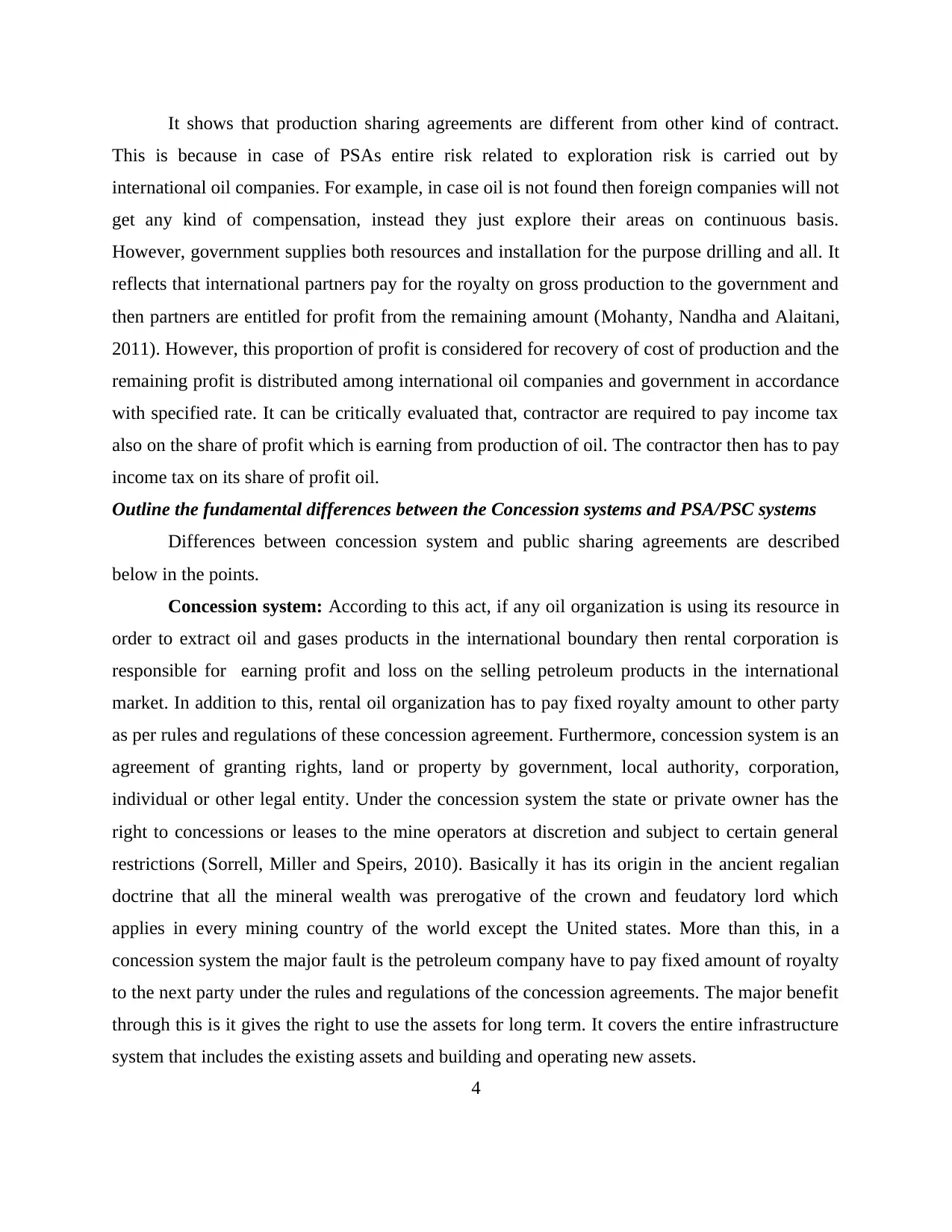
It shows that production sharing agreements are different from other kind of contract.
This is because in case of PSAs entire risk related to exploration risk is carried out by
international oil companies. For example, in case oil is not found then foreign companies will not
get any kind of compensation, instead they just explore their areas on continuous basis.
However, government supplies both resources and installation for the purpose drilling and all. It
reflects that international partners pay for the royalty on gross production to the government and
then partners are entitled for profit from the remaining amount (Mohanty, Nandha and Alaitani,
2011). However, this proportion of profit is considered for recovery of cost of production and the
remaining profit is distributed among international oil companies and government in accordance
with specified rate. It can be critically evaluated that, contractor are required to pay income tax
also on the share of profit which is earning from production of oil. The contractor then has to pay
income tax on its share of profit oil.
Outline the fundamental differences between the Concession systems and PSA/PSC systems
Differences between concession system and public sharing agreements are described
below in the points.
Concession system: According to this act, if any oil organization is using its resource in
order to extract oil and gases products in the international boundary then rental corporation is
responsible for earning profit and loss on the selling petroleum products in the international
market. In addition to this, rental oil organization has to pay fixed royalty amount to other party
as per rules and regulations of these concession agreement. Furthermore, concession system is an
agreement of granting rights, land or property by government, local authority, corporation,
individual or other legal entity. Under the concession system the state or private owner has the
right to concessions or leases to the mine operators at discretion and subject to certain general
restrictions (Sorrell, Miller and Speirs, 2010). Basically it has its origin in the ancient regalian
doctrine that all the mineral wealth was prerogative of the crown and feudatory lord which
applies in every mining country of the world except the United states. More than this, in a
concession system the major fault is the petroleum company have to pay fixed amount of royalty
to the next party under the rules and regulations of the concession agreements. The major benefit
through this is it gives the right to use the assets for long term. It covers the entire infrastructure
system that includes the existing assets and building and operating new assets.
4
This is because in case of PSAs entire risk related to exploration risk is carried out by
international oil companies. For example, in case oil is not found then foreign companies will not
get any kind of compensation, instead they just explore their areas on continuous basis.
However, government supplies both resources and installation for the purpose drilling and all. It
reflects that international partners pay for the royalty on gross production to the government and
then partners are entitled for profit from the remaining amount (Mohanty, Nandha and Alaitani,
2011). However, this proportion of profit is considered for recovery of cost of production and the
remaining profit is distributed among international oil companies and government in accordance
with specified rate. It can be critically evaluated that, contractor are required to pay income tax
also on the share of profit which is earning from production of oil. The contractor then has to pay
income tax on its share of profit oil.
Outline the fundamental differences between the Concession systems and PSA/PSC systems
Differences between concession system and public sharing agreements are described
below in the points.
Concession system: According to this act, if any oil organization is using its resource in
order to extract oil and gases products in the international boundary then rental corporation is
responsible for earning profit and loss on the selling petroleum products in the international
market. In addition to this, rental oil organization has to pay fixed royalty amount to other party
as per rules and regulations of these concession agreement. Furthermore, concession system is an
agreement of granting rights, land or property by government, local authority, corporation,
individual or other legal entity. Under the concession system the state or private owner has the
right to concessions or leases to the mine operators at discretion and subject to certain general
restrictions (Sorrell, Miller and Speirs, 2010). Basically it has its origin in the ancient regalian
doctrine that all the mineral wealth was prerogative of the crown and feudatory lord which
applies in every mining country of the world except the United states. More than this, in a
concession system the major fault is the petroleum company have to pay fixed amount of royalty
to the next party under the rules and regulations of the concession agreements. The major benefit
through this is it gives the right to use the assets for long term. It covers the entire infrastructure
system that includes the existing assets and building and operating new assets.
4
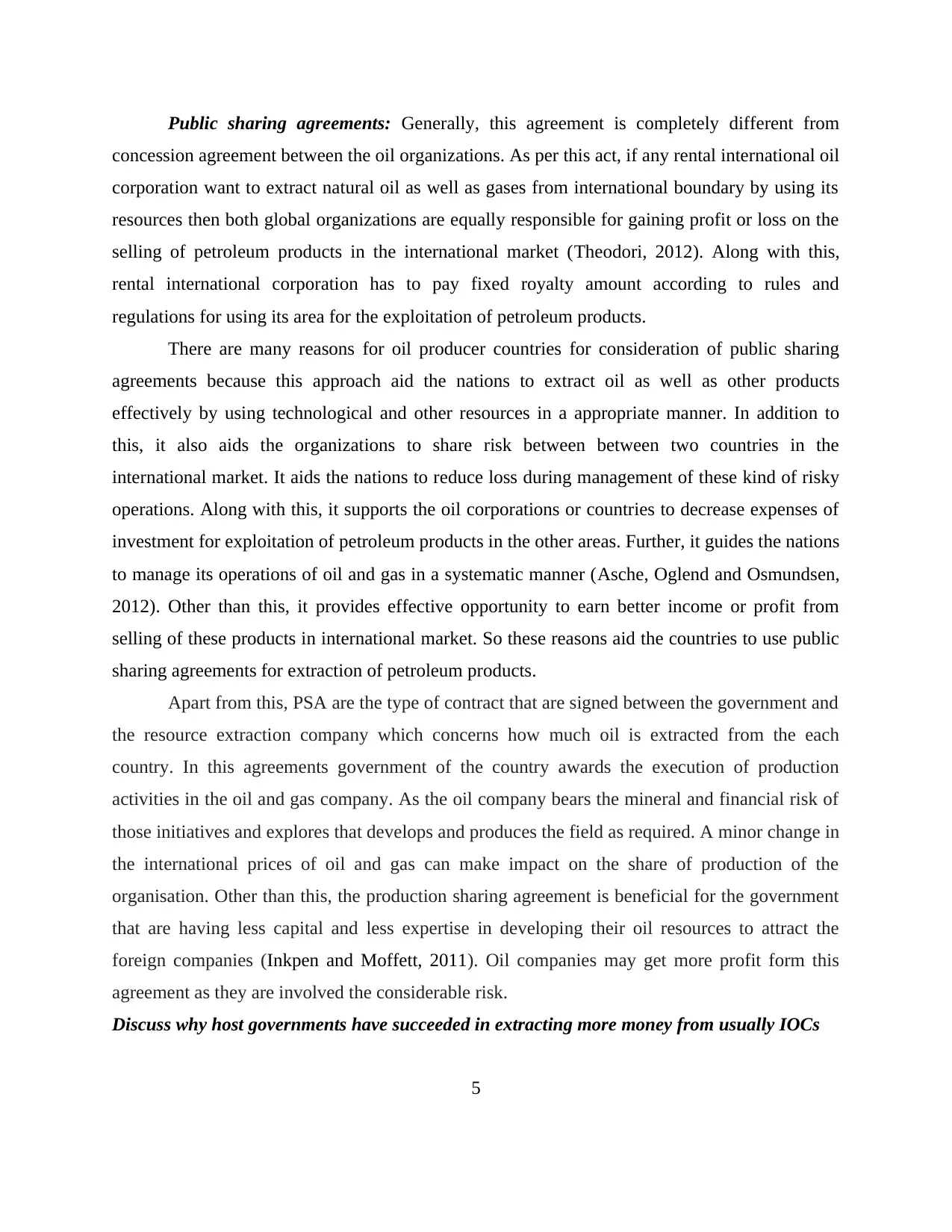
Public sharing agreements: Generally, this agreement is completely different from
concession agreement between the oil organizations. As per this act, if any rental international oil
corporation want to extract natural oil as well as gases from international boundary by using its
resources then both global organizations are equally responsible for gaining profit or loss on the
selling of petroleum products in the international market (Theodori, 2012). Along with this,
rental international corporation has to pay fixed royalty amount according to rules and
regulations for using its area for the exploitation of petroleum products.
There are many reasons for oil producer countries for consideration of public sharing
agreements because this approach aid the nations to extract oil as well as other products
effectively by using technological and other resources in a appropriate manner. In addition to
this, it also aids the organizations to share risk between between two countries in the
international market. It aids the nations to reduce loss during management of these kind of risky
operations. Along with this, it supports the oil corporations or countries to decrease expenses of
investment for exploitation of petroleum products in the other areas. Further, it guides the nations
to manage its operations of oil and gas in a systematic manner (Asche, Oglend and Osmundsen,
2012). Other than this, it provides effective opportunity to earn better income or profit from
selling of these products in international market. So these reasons aid the countries to use public
sharing agreements for extraction of petroleum products.
Apart from this, PSA are the type of contract that are signed between the government and
the resource extraction company which concerns how much oil is extracted from the each
country. In this agreements government of the country awards the execution of production
activities in the oil and gas company. As the oil company bears the mineral and financial risk of
those initiatives and explores that develops and produces the field as required. A minor change in
the international prices of oil and gas can make impact on the share of production of the
organisation. Other than this, the production sharing agreement is beneficial for the government
that are having less capital and less expertise in developing their oil resources to attract the
foreign companies (Inkpen and Moffett, 2011). Oil companies may get more profit form this
agreement as they are involved the considerable risk.
Discuss why host governments have succeeded in extracting more money from usually IOCs
5
concession agreement between the oil organizations. As per this act, if any rental international oil
corporation want to extract natural oil as well as gases from international boundary by using its
resources then both global organizations are equally responsible for gaining profit or loss on the
selling of petroleum products in the international market (Theodori, 2012). Along with this,
rental international corporation has to pay fixed royalty amount according to rules and
regulations for using its area for the exploitation of petroleum products.
There are many reasons for oil producer countries for consideration of public sharing
agreements because this approach aid the nations to extract oil as well as other products
effectively by using technological and other resources in a appropriate manner. In addition to
this, it also aids the organizations to share risk between between two countries in the
international market. It aids the nations to reduce loss during management of these kind of risky
operations. Along with this, it supports the oil corporations or countries to decrease expenses of
investment for exploitation of petroleum products in the other areas. Further, it guides the nations
to manage its operations of oil and gas in a systematic manner (Asche, Oglend and Osmundsen,
2012). Other than this, it provides effective opportunity to earn better income or profit from
selling of these products in international market. So these reasons aid the countries to use public
sharing agreements for extraction of petroleum products.
Apart from this, PSA are the type of contract that are signed between the government and
the resource extraction company which concerns how much oil is extracted from the each
country. In this agreements government of the country awards the execution of production
activities in the oil and gas company. As the oil company bears the mineral and financial risk of
those initiatives and explores that develops and produces the field as required. A minor change in
the international prices of oil and gas can make impact on the share of production of the
organisation. Other than this, the production sharing agreement is beneficial for the government
that are having less capital and less expertise in developing their oil resources to attract the
foreign companies (Inkpen and Moffett, 2011). Oil companies may get more profit form this
agreement as they are involved the considerable risk.
Discuss why host governments have succeeded in extracting more money from usually IOCs
5
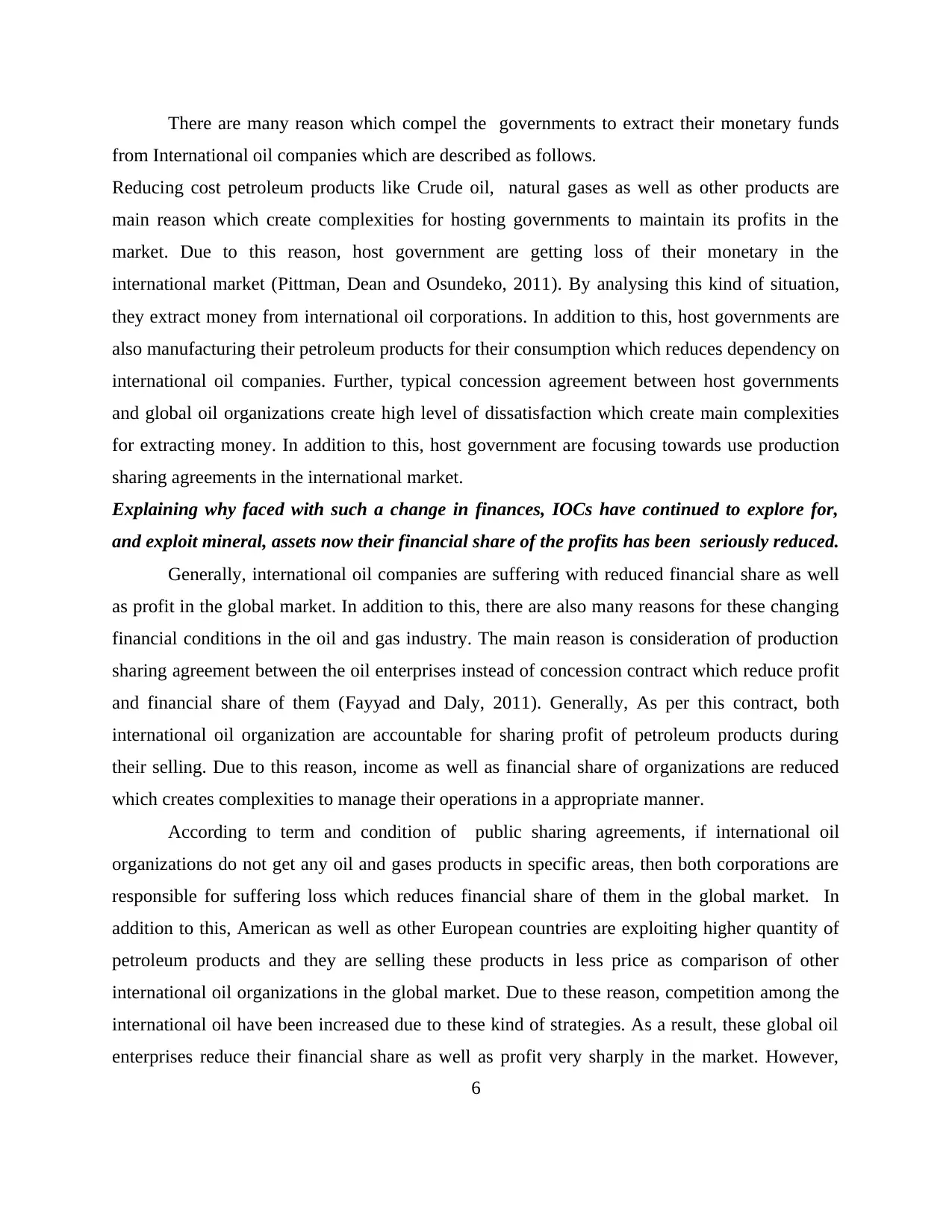
There are many reason which compel the governments to extract their monetary funds
from International oil companies which are described as follows.
Reducing cost petroleum products like Crude oil, natural gases as well as other products are
main reason which create complexities for hosting governments to maintain its profits in the
market. Due to this reason, host government are getting loss of their monetary in the
international market (Pittman, Dean and Osundeko, 2011). By analysing this kind of situation,
they extract money from international oil corporations. In addition to this, host governments are
also manufacturing their petroleum products for their consumption which reduces dependency on
international oil companies. Further, typical concession agreement between host governments
and global oil organizations create high level of dissatisfaction which create main complexities
for extracting money. In addition to this, host government are focusing towards use production
sharing agreements in the international market.
Explaining why faced with such a change in finances, IOCs have continued to explore for,
and exploit mineral, assets now their financial share of the profits has been seriously reduced.
Generally, international oil companies are suffering with reduced financial share as well
as profit in the global market. In addition to this, there are also many reasons for these changing
financial conditions in the oil and gas industry. The main reason is consideration of production
sharing agreement between the oil enterprises instead of concession contract which reduce profit
and financial share of them (Fayyad and Daly, 2011). Generally, As per this contract, both
international oil organization are accountable for sharing profit of petroleum products during
their selling. Due to this reason, income as well as financial share of organizations are reduced
which creates complexities to manage their operations in a appropriate manner.
According to term and condition of public sharing agreements, if international oil
organizations do not get any oil and gases products in specific areas, then both corporations are
responsible for suffering loss which reduces financial share of them in the global market. In
addition to this, American as well as other European countries are exploiting higher quantity of
petroleum products and they are selling these products in less price as comparison of other
international oil organizations in the global market. Due to these reason, competition among the
international oil have been increased due to these kind of strategies. As a result, these global oil
enterprises reduce their financial share as well as profit very sharply in the market. However,
6
from International oil companies which are described as follows.
Reducing cost petroleum products like Crude oil, natural gases as well as other products are
main reason which create complexities for hosting governments to maintain its profits in the
market. Due to this reason, host government are getting loss of their monetary in the
international market (Pittman, Dean and Osundeko, 2011). By analysing this kind of situation,
they extract money from international oil corporations. In addition to this, host governments are
also manufacturing their petroleum products for their consumption which reduces dependency on
international oil companies. Further, typical concession agreement between host governments
and global oil organizations create high level of dissatisfaction which create main complexities
for extracting money. In addition to this, host government are focusing towards use production
sharing agreements in the international market.
Explaining why faced with such a change in finances, IOCs have continued to explore for,
and exploit mineral, assets now their financial share of the profits has been seriously reduced.
Generally, international oil companies are suffering with reduced financial share as well
as profit in the global market. In addition to this, there are also many reasons for these changing
financial conditions in the oil and gas industry. The main reason is consideration of production
sharing agreement between the oil enterprises instead of concession contract which reduce profit
and financial share of them (Fayyad and Daly, 2011). Generally, As per this contract, both
international oil organization are accountable for sharing profit of petroleum products during
their selling. Due to this reason, income as well as financial share of organizations are reduced
which creates complexities to manage their operations in a appropriate manner.
According to term and condition of public sharing agreements, if international oil
organizations do not get any oil and gases products in specific areas, then both corporations are
responsible for suffering loss which reduces financial share of them in the global market. In
addition to this, American as well as other European countries are exploiting higher quantity of
petroleum products and they are selling these products in less price as comparison of other
international oil organizations in the global market. Due to these reason, competition among the
international oil have been increased due to these kind of strategies. As a result, these global oil
enterprises reduce their financial share as well as profit very sharply in the market. However,
6
Paraphrase This Document
Need a fresh take? Get an instant paraphrase of this document with our AI Paraphraser
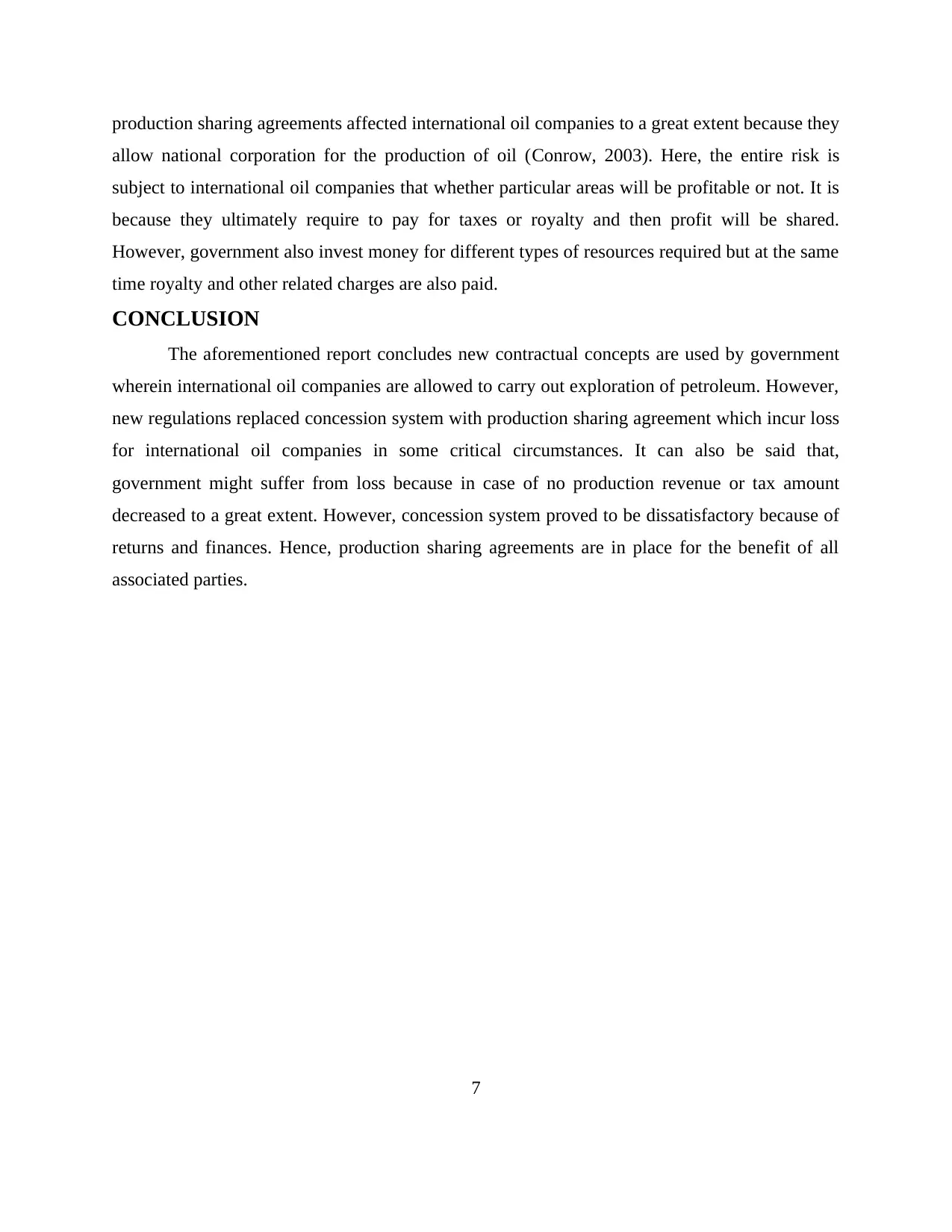
production sharing agreements affected international oil companies to a great extent because they
allow national corporation for the production of oil (Conrow, 2003). Here, the entire risk is
subject to international oil companies that whether particular areas will be profitable or not. It is
because they ultimately require to pay for taxes or royalty and then profit will be shared.
However, government also invest money for different types of resources required but at the same
time royalty and other related charges are also paid.
CONCLUSION
The aforementioned report concludes new contractual concepts are used by government
wherein international oil companies are allowed to carry out exploration of petroleum. However,
new regulations replaced concession system with production sharing agreement which incur loss
for international oil companies in some critical circumstances. It can also be said that,
government might suffer from loss because in case of no production revenue or tax amount
decreased to a great extent. However, concession system proved to be dissatisfactory because of
returns and finances. Hence, production sharing agreements are in place for the benefit of all
associated parties.
7
allow national corporation for the production of oil (Conrow, 2003). Here, the entire risk is
subject to international oil companies that whether particular areas will be profitable or not. It is
because they ultimately require to pay for taxes or royalty and then profit will be shared.
However, government also invest money for different types of resources required but at the same
time royalty and other related charges are also paid.
CONCLUSION
The aforementioned report concludes new contractual concepts are used by government
wherein international oil companies are allowed to carry out exploration of petroleum. However,
new regulations replaced concession system with production sharing agreement which incur loss
for international oil companies in some critical circumstances. It can also be said that,
government might suffer from loss because in case of no production revenue or tax amount
decreased to a great extent. However, concession system proved to be dissatisfactory because of
returns and finances. Hence, production sharing agreements are in place for the benefit of all
associated parties.
7
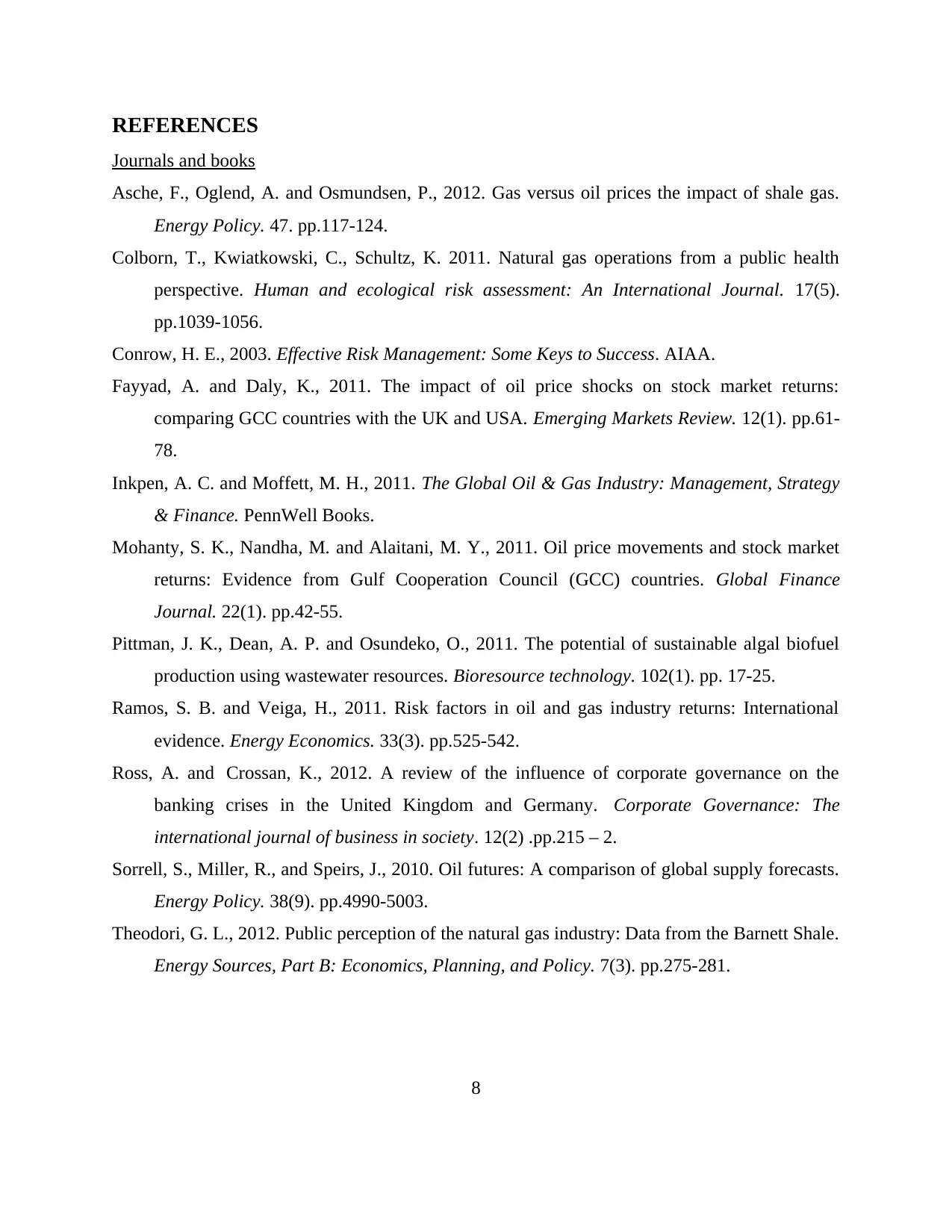
REFERENCES
Journals and books
Asche, F., Oglend, A. and Osmundsen, P., 2012. Gas versus oil prices the impact of shale gas.
Energy Policy. 47. pp.117-124.
Colborn, T., Kwiatkowski, C., Schultz, K. 2011. Natural gas operations from a public health
perspective. Human and ecological risk assessment: An International Journal. 17(5).
pp.1039-1056.
Conrow, H. E., 2003. Effective Risk Management: Some Keys to Success. AIAA.
Fayyad, A. and Daly, K., 2011. The impact of oil price shocks on stock market returns:
comparing GCC countries with the UK and USA. Emerging Markets Review. 12(1). pp.61-
78.
Inkpen, A. C. and Moffett, M. H., 2011. The Global Oil & Gas Industry: Management, Strategy
& Finance. PennWell Books.
Mohanty, S. K., Nandha, M. and Alaitani, M. Y., 2011. Oil price movements and stock market
returns: Evidence from Gulf Cooperation Council (GCC) countries. Global Finance
Journal. 22(1). pp.42-55.
Pittman, J. K., Dean, A. P. and Osundeko, O., 2011. The potential of sustainable algal biofuel
production using wastewater resources. Bioresource technology. 102(1). pp. 17-25.
Ramos, S. B. and Veiga, H., 2011. Risk factors in oil and gas industry returns: International
evidence. Energy Economics. 33(3). pp.525-542.
Ross, A. and Crossan, K., 2012. A review of the influence of corporate governance on the
banking crises in the United Kingdom and Germany. Corporate Governance: The
international journal of business in society. 12(2) .pp.215 – 2.
Sorrell, S., Miller, R., and Speirs, J., 2010. Oil futures: A comparison of global supply forecasts.
Energy Policy. 38(9). pp.4990-5003.
Theodori, G. L., 2012. Public perception of the natural gas industry: Data from the Barnett Shale.
Energy Sources, Part B: Economics, Planning, and Policy. 7(3). pp.275-281.
8
Journals and books
Asche, F., Oglend, A. and Osmundsen, P., 2012. Gas versus oil prices the impact of shale gas.
Energy Policy. 47. pp.117-124.
Colborn, T., Kwiatkowski, C., Schultz, K. 2011. Natural gas operations from a public health
perspective. Human and ecological risk assessment: An International Journal. 17(5).
pp.1039-1056.
Conrow, H. E., 2003. Effective Risk Management: Some Keys to Success. AIAA.
Fayyad, A. and Daly, K., 2011. The impact of oil price shocks on stock market returns:
comparing GCC countries with the UK and USA. Emerging Markets Review. 12(1). pp.61-
78.
Inkpen, A. C. and Moffett, M. H., 2011. The Global Oil & Gas Industry: Management, Strategy
& Finance. PennWell Books.
Mohanty, S. K., Nandha, M. and Alaitani, M. Y., 2011. Oil price movements and stock market
returns: Evidence from Gulf Cooperation Council (GCC) countries. Global Finance
Journal. 22(1). pp.42-55.
Pittman, J. K., Dean, A. P. and Osundeko, O., 2011. The potential of sustainable algal biofuel
production using wastewater resources. Bioresource technology. 102(1). pp. 17-25.
Ramos, S. B. and Veiga, H., 2011. Risk factors in oil and gas industry returns: International
evidence. Energy Economics. 33(3). pp.525-542.
Ross, A. and Crossan, K., 2012. A review of the influence of corporate governance on the
banking crises in the United Kingdom and Germany. Corporate Governance: The
international journal of business in society. 12(2) .pp.215 – 2.
Sorrell, S., Miller, R., and Speirs, J., 2010. Oil futures: A comparison of global supply forecasts.
Energy Policy. 38(9). pp.4990-5003.
Theodori, G. L., 2012. Public perception of the natural gas industry: Data from the Barnett Shale.
Energy Sources, Part B: Economics, Planning, and Policy. 7(3). pp.275-281.
8
1 out of 9
Your All-in-One AI-Powered Toolkit for Academic Success.
+13062052269
info@desklib.com
Available 24*7 on WhatsApp / Email
![[object Object]](/_next/static/media/star-bottom.7253800d.svg)
Unlock your academic potential
© 2024 | Zucol Services PVT LTD | All rights reserved.


